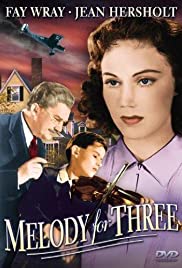
MELODY FOR THREE
US, 1941, 67 minutes, Black-and-white.
Jean Hersholt, Fay Wray, Walter Wookf King, Astrid Allwyn, Bryn Ryan, Schuyler Standish, Maude Eburne.
Directed by Erle C Kenton.
This is one of six films in a series focusing on a kindly doctor, with a touch of the detective, who lives in the town of Rivers End, Minnesota. He is Dr Christian. And he is played by veteran actor, Jean Hersholt (after whom the humanities award of the American Academy is named).
As can be seen from the title, this is a film about music. In River’s End, there is a skilful piano teacher, passing as a widow, who had married young, a famous music conductor who had abandoned her and her son. The son is quite a violin prodigy – well performed by Skyler Standish who did not follow-up in films but went on concert tours.
So, there is a lot of pathos about the music teacher, played by Fay Wray, and her place in the town, especially with other music students, including a boy who has no musical talent but is pushed by his parents. In the town, there is a rival teacher, Irene Ryan, who takes on everyone, is quite bombastic in her lessons and promotion. There is a concert for all the parents – with some terrible performances!
A plane crashes and who should be on board but the conductor. Dr Christian recognises him and organises the music teacher, who also serves as a nurse at the hospital, to come to tend him. He does recognise her and there is reflection on their past but he does not know that he has a son. In the meantime, the rival teacher has organised her students to do an audition for him in the hospital corridor, cacophonous diin. The mother has organised her son to audition for his father but it is interrupted by his manager who wants him to get to Chicago for rehearsals on time as well as to a woman who has presumed that she will marry him. Lots of emotional conflict – the teacher leaving town upset, the conductor phoning his wife with his son answering.
Dr Christian organises a visit to Chicago with the boy, goes on a tour of the television station (interesting to see the early development of television in the 1941 film), urges the boy to play the violin while the orchestra is rehearsing. He makes an extraordinary impression, leading to performance, Dr Christian and his mother present, happy ending.
While the running time is brief, there is quite a lot of orchestral music, especially Brahms.